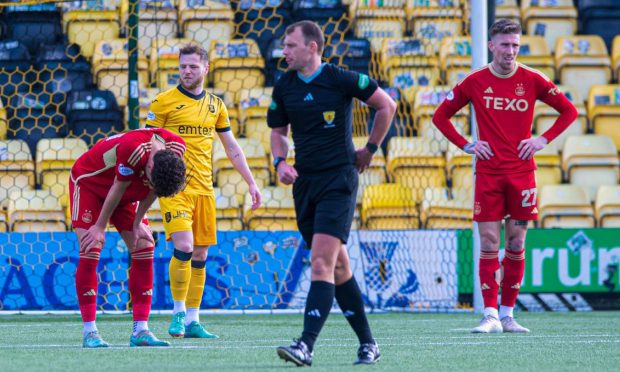Aberdeen’s bottom six fate was confirmed by a 0-0 bore draw at Livingston on Saturday, but how did referee Graham Grainger and Matthew MacDermid on VAR perform?
There were several stoppages for head knocks during the game, and I thought the referee managed most of the the situations well.
The one exception was when Livingston striker Tete Yengi was clearly caught by a high boot from Richard Jensen.
I think the Finnish international was careless putting his boot so high. Though I wouldn’t say it warranted anything more than a caution, I thought Jensen was lucky to escape with no punishment at all.
Yengi also refused treatment for a good minute-and-a-half before the physios came on. Given the nature of the injury, the referee should have taken greater control and realised the player clearly needed treatment.
Officials should have shown working on Dons’ offside goal
We now move on to the key call of the game – Bojan Miovski’s disallowed late winner.
Miovski eventually finished acrobatically after a free-kick was knocked across the box by team-mate Angus MacDonald.
After a VAR review, it was decided MacDonald was offside when the free-kick was taken.
Having seen the footage, it looks very tight and I do find it strange lines weren’t drawn on the image and provided to the media.
Even if it is obvious, lines are normally still drawn.
With VAR, offsides are meant to be factual, non subjective decisions, and providing the lines would have shown MacDermid’s working and put any suggestions of the call being incorrect to bed.
If they were confident he was off, we will have to take the officials word.
Should Livingston v Aberdeen have even gone ahead?
Before a ball was kicked on Saturday, another important decision the referee had to make, in line with many referees across the country, was whether or not the game could be played.
The really windy weather had a huge impact on the quality of the fixture in East Lothian – it reminded me of St Johnstone at home earlier in the season.
At one point during proceedings, I did think the referee may have been considering whether it was right to continue.
Just before the half, a Kelle Roos goal-kick barely made it out of his box.
There has been plenty of debate this week about the pressure on officials to get the pre-Premiership split matches on.
When it comes to abandoning a game, there are several factors which need to be considered. Player safety is the most important by a country mile.
With the ball swirling in the air, it did make potential head injuries more likely (as proved by the amount of head knock stoppages) as players struggled to read the path of the ball.
At this stage of the season, the authorities and referees are likely more determined to get every game finished, even if it isn’t the correct option.
Finlay Elder was a registered referee for six years and a category 5 official from 2019, with experience in the Highland League, Juniors and Club Academy.




Conversation